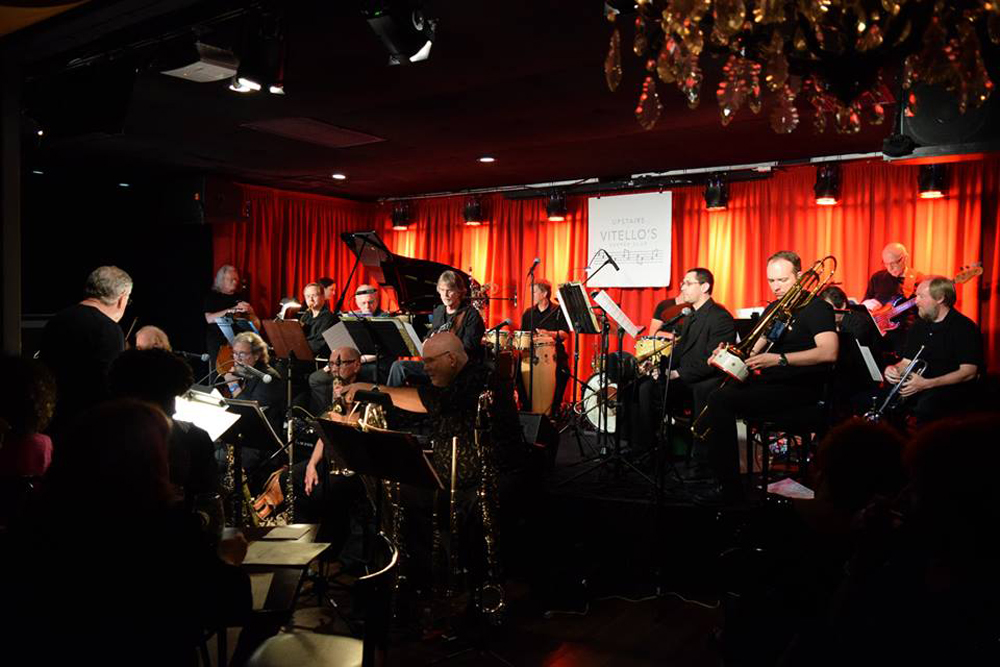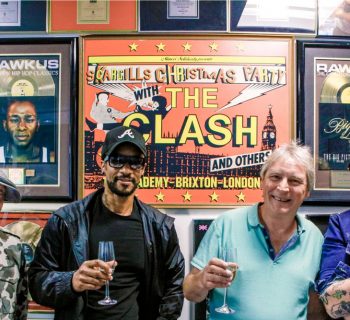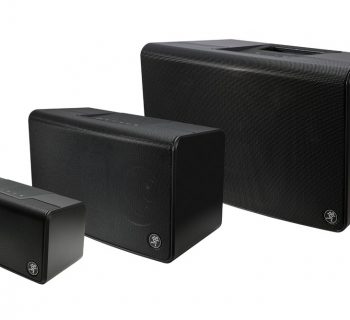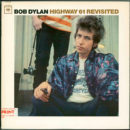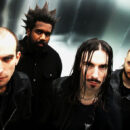Lord Huron are something of a mystery. Soon after the Los Angeles band materialized in 2010, it seemed like they had always been around. There was something endearingly familiar about their sound, which seemed to emanate from the sparks of indie-folk’s explosion and Vampire Weekend’s implosion. Frontman Ben Schneider’s wholesome Midwestern voice seemed oddly familiar, and his band’s hushed delivery made it seem like the humble kid in the classroom had finally gotten some notice.
Any previously vague familiarity jelled into blanket recognition as the group landed a seemingly never-ending stream of musical appearances in various TV shows and movies. 13 Reasons Why? Check. Shameless? Check. Girls? Check. Community and The Vampire Diaries and Once Upon a Time? Check, check, check.
Lord Huron’s music even appeared on the soundtrack to a Robert Redford-starring movie about the Appalachian Trail––even though the band is from Los Angeles and frontman Ben Schneider grew up in Michigan.
Notwithstanding the crests of limelight that those TV shows and movie appearances secured for the band, Schneider spent a solid two years writing the follow-up to Strange Trails (and its massively successful single “The Night We Met”). The singer, guitarist, harmonica ace, multimedia artist and songwriter then shared the material with his bandmates: guitarist/singer Tom Renaud, percussionist/singer Mark Barry and bassist/multi-instrumentalist Miguel Briseno. Altogether, they shaped Vide Noir into a 12-song volume.
The word “noir” is a tip of the Panama hat to anyone familiar with L.A.’s sultry underbelly––and more specifically, classic detective stories led by hard-boiled hero Philip Marlowe and penned by author Raymond Chandler. Driving the point home, Schneider has revealed that the song “When the Night Is Over” was directly inspired by the Big Sleep writer, while the album’s first single “Wait by the River” has a doo-wop sound that could fit comfortably in the era of Marlowe.
Schneider wrote Vide Noir—which was mixed by David Fridmann—while taking late-night drives and walks on some of the streets where Chandler and Marlowe laid their feet. But the multi-hyphenate frontman’s ideas for the album also coalesced during his travels abroad, as he revealed in a recent, far-reaching conversation with Music Connection.
Music Connection: For starters, congratulations on Vide Noir.
Ben Schneider: Thank you.
MC: Before recording this album, you tested out some of the songs while on tour. Is it Lord Huron’s protocol to test out new material before hitting the studio?
Schneider: We always tend to have at least a couple of songs on each record that we play a while before we record it. That’s been true for pretty much every record we’ve made. It’s a nice chance to see how the songs go. Later, sometimes people will say, “This lyric is different, this chorus is different.” It’s funny to look back at old versions of songs with different lyrics. They’re an interesting document.
MC: What additional preparation do you do before recording an album?
Schneider: I did demo pretty extensively, so I had the album pretty much laid out entirely before we properly went into the studio. The ease of computer recording [also helped with] the quality. I tend to go to the guys [in the band] with a demo or blueprint of the record, then I let them add their touches or play the parts, so it always improves a lot at that stage.
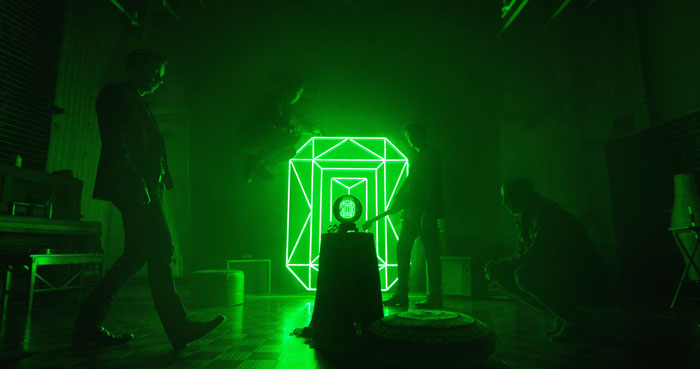 MC: Describe the writing of the record—which you did without contractual obligations to a record label—versus your previous releases. Was it a more relaxed process?
MC: Describe the writing of the record—which you did without contractual obligations to a record label—versus your previous releases. Was it a more relaxed process?
Schneider: Yeah, it was. It’s kind of a nice luxury, to be honest. Our general philosophy is to take our time with things and not put anything out until we feel good about it. We have no schedule to follow. We all felt pretty ragged from just touring so much, and we made a conscious decision to take some time off. I never really take time off; when I say I am, I’m still writing and recording. But it was low pressure. We have our studio, so we can record whenever we feel up to it. We let the songs bloom and blossom.
MC: Do you still mostly write by yourself, or is the rest of the band more participatory now, especially given how much you tour?
Schneider: I write stripped-down parts and the structure of the songs, then marry them with the studio sound. We had a lot of time working in our own clubhouse and exploring together.
Every time we do a record, it’s different, and every time the other band members are more involved in the process. They’re my favorite musicians and my best friends. That said, in terms of writing, it’s best to have one perspective and one voice.
MC: What did the timeline end up looking like?
Schneider: Some of the stuff I started demoing as far back as 2015, so we took our time. Last year I took some time off at the beginning of the year and went traveling for a few months. So we took two years. We finished in early December of 2017.
MC: Would you call Vide Noir an L.A.-centric album?
Schneider: I think that’s the idea. The album started coalescing while we were on tour. On the road, I jot down fragments or story ideas on my phone, and when I get back to L.A. I lay it all out, I see what’s worth considering, what’s worth pursuing, see what needs to get thrown out, what needs to get put together. I had all these fragments, driving around L.A., that I started conceptualizing.
MC: There’s a myriad of references to Raymond Chandler, one of the most notable writers in the history of mystery and pulp writing—and one of my favorite writers too. One of the central characters in his stories was the city of Los Angeles itself, which took on a dark, shady, seedy personality. When did you become interested in Chandler’s books?
Schneider: My dad—and my grandmother—was a huge crime-fiction fan in general, but in particular a fan of Raymond Chandler. I don’t remember when I read my favorite book of his, but it was when I moved to L.A. I started really picturing these places and events he was describing. When you live here, you can really fall in love with his stories.
MC: And, despite how quickly Los Angeles appears to outwardly change, Chandler’s stories—many of them around 80 years old—paint suspiciously accurate portraits depicting inward truths about this place.
Schneider: Yeah, that world he created is still here. It’s really evocative, this old L.A., Hollywood, which is so beautifully described in his books. The vibe he creates is really singular and just so clear and vivid.
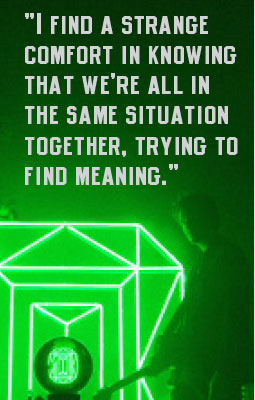 MC: Do you, like Chandler, try to create a world when you’re writing an album?
MC: Do you, like Chandler, try to create a world when you’re writing an album?
Schneider: Yeah, and a longer story if I can. With the album format, you can tell a rich story, but it still leaves all this other space for the imagination. What got me into music when I was young was not just the songs themselves, but the endless experience beyond the songs themselves. Once I started to realize that, I got really interested in trying to do that myself. It’s harder than it seems.
MC: Have you visited any of Chandler’s stomping grounds?
Schneider: I drive a lot, and some drives have taken me past some of those places. You can find them on the Internet now. That feeling in his books that there’s this whole sort of work that’s operating out there, and it’s seedy and there’s all these untold stories that are unfolding in this huge grid of a city … it’s very unique.
MC: Your first two albums came out on indie label I Am Sound Records. Why did you ultimately choose Republic to release Vide Noir, in conjunction with your own label, Whispering Pines? Were there many other contenders?
Schneider: Deciding on a label involves a lot of people, and there are a lot of conversations that need to be had. It’s not an easy decision. What it came down to is Republic seemed really excited and gave us the terms we really wanted, which for us mostly has to do with creative issues.
A lot of bands can get into a bad situation. It was a little different for us because our record was already done. So we made the record we wanted to make and showed it to a lot of people and see who was the most excited and had the best ideas of what to do with it.
To be honest, Republic wasn’t the label I would’ve guessed [we’d release our album through], but they seemed really fired up and let us do what we wanted to do. And they had the resources. We’re very DIY, which is good in a lot of ways, but eventually you need infrastructure and money to make certain ideas come to fruition.
MC: Were you at all reluctant to go with a major label for the first time, or is that a nonissue in 2018?
Schneider: It was definitely a consideration. The uncertainty about major labels is still in my head. I’ve had some friends [burned] for sure. Still, I don’t know how much of [the issues that some artists have with major labels] is rooted in fact anymore. I grew up listening to punk rock and thinking major labels were sellouts; but it’s different once you’re in the business. We didn’t want someone to encroach on what we had done, and the deal we made with [Republic] was similar to what you’d do with an indie label. The resources are what we needed at this time.
MC: What types of resources in particular?
Schneider: For years we’ve been meaning to incorporate more visuals and projections at our shows, but it’s been hard because we’ve been playing such different venues every night: clubs, festivals, theaters. It does present challenges when it’s that varied. Now it’s kind of consistent; the rooms are similar size. We want consistent lighting, and we’re working on that now.
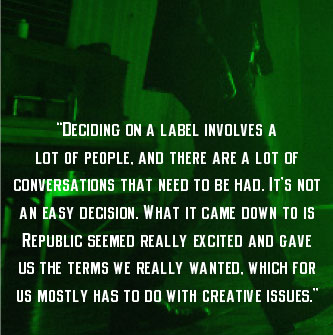 MC: You’ve said Vide Noir is about “a search for meaning amidst the cold indifference of the universe.” Have you always felt that way, or is loneliness a burden that comes with mainstream success?
MC: You’ve said Vide Noir is about “a search for meaning amidst the cold indifference of the universe.” Have you always felt that way, or is loneliness a burden that comes with mainstream success?
Schneider: Interesting question. For me, it’s something I’ve always been interested in pondering. More recently it’s that feeling of being indifferent in the universe. I find a strange comfort in knowing that we’re all in the same situation together, trying to find meaning. It’s not something I think I’ll ever solve or comes to work with. I’m a big fan of thinking hard about those types of questions. We’ve explored this theme throughout or discography and will continue to.
MC: Have you read Man’s Search for Meaning by Viktor Frankl?
Schneider: That’s funny, it’s on my bookshelf, I’m planning to bring it on tour!
MC: Are you planning to hit any unlikely places on tour?
Schneider: There are all sorts of different places that are memorable. Boise, Idaho, was a very energetic show. Birmingham, Alabama. Sometimes you’ll play a show in a big city, and it’ll fall flat. What keeps it fresh is going back and having a different experience. Just about every place we’ve gone to has surprised me in some way. Our recent trip to Europe … I don’t know why I have such a hard time believing people know what we’re making and appreciate it.
MC: Speaking of traveling to exotic places, you released seven songs from Vide Noir as streams accessible at geo-locations including parks and beaches. Not to mention a volcano. Whereabouts is it located?
Schneider: The volcano is in Hawaii. The idea [with geo-tagging] was to give people the chance to listen to new songs—but we wanted to get people to see stuff that was beautiful and natural at the same time. And we’re releasing more stuff today. It’s great watching people go out, in some cases hike seven miles.
MC: You also aired a public-access TV show in various U.S. cities, giving fans a chance to live in the world you’ve created with Vide Noir. Do you have even more creative diversions up your sleeve?
Schneider: Our geo-tagging is there for you to explore if you’re up for it, but this time around we have all this visual content and film we’re releasing, and geo-content we’re releasing into the world, and this hotline. A big scavenger hunt is coming up soon, and there’s video content we’re releasing and in which we explore the record and some of the specific stories. We’re really excited to get it all out there. I don’t want to spoil any more surprises.
MC: It sounds like part of the idea behind geo-locations and the scavenger hunt is to get people out of their apartments or houses. The other night I saw Werner Herzog speak, and he said, “Life reveals itself to those who are on foot.” He also told the audience to “anchor yourselves in reality.”
Schneider: That’s definitely part of it. We’re pretty struck by how much technology has infiltrated our lives in ways you don’t even think about. I consider myself pretty separate from technology, but even I find myself trapped. I don’t want to preach to anybody or anything, I’m not trying to force anyone against technology, but I think it’s good to break away from it. Having a firm foot in reality and engaging with this whole rich world that’s out there.
MC: Is that why you enjoy touring so much?
Schneider: That’s definitely part of it. Touring happens to be a convenient way of getting to see the world. We’ve had the opportunities to see an awful lot of stuff and share our music with other people. It still surprises me when I see someone dancing and singing the words to our music.
Contact cami.opere@sacksco.com

